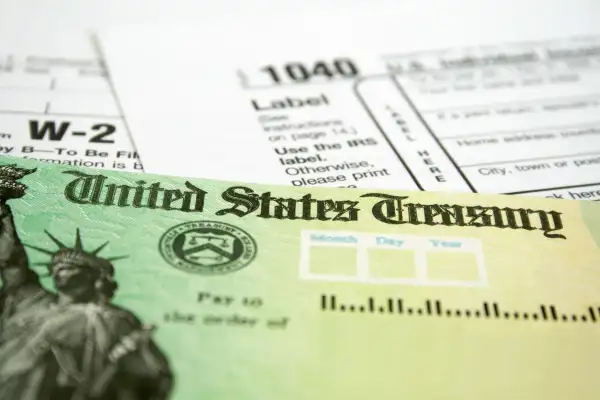The IRS Now Says People Are Getting Bigger Tax Refunds in 2019. Here’s Why

How big will your tax refund be in 2019? The outcome is always somewhat of a guessing game at tax time, but this year taxpayers have encountered an extra mystery when filing. After hearing for weeks that income-tax refunds are lower than 2018, you may be pleasantly surprised — and simultaneously confused — to learn that the IRS now says that average federal tax refunds are higher than last year.
The most recent IRS data shows that the average tax refund, for returns filed through February 22, 2019, is $3,143. That's slightly higher than the average refund filed by roughly the same time in 2018: $3,013.
As of February 1, 2019, however, the average income-tax refund among returns filed was only $1,865, according to the IRS, versus $2,035 for the comparable time frame one year ago.
We'll try to explain why tax refunds are bigger lately, why refunds were smaller earlier in the 2019 tax season — and why these trends do not necessarily mean that your personal tax burden is bigger or smaller compared to previous years.
How Big Will My Tax Refund Be?
The current tax season marks the first year that the 2017 tax cuts are fully in effect, and it's been difficult for many taxpayers to tell how the changes impact their tax returns — and potential tax refunds. Most people are indeed enjoying a tax cut, but not everyone will wind up paying less in taxes.
In early 2018, the federal government instructed employers to adjust the withholdings on worker paychecks, to reflect the new rates and changes instituted by the Tax Cuts and Jobs Act passed in 2017. If withholdings were changed correctly, the typical worker has been enjoying a bigger paycheck throughout 2018 — because less was being taken out in federal taxes every two weeks.
For most middle and upper-middle income earners receiving a large refund means you paid too much in taxes during the course of the year. So, while some people love getting tax refunds because it feels like free money from the government, a tax refund is actually just an indication that you've been overpaying taxes and are owed some of your own money back.
It may feel great to get a big tax refund, and you should indeed try to get the biggest refund possible when filing. But if you want to grasp the true impact of the Tax Cuts and Jobs Act, you must focus on how much you pay overall in taxes — not just at tax filing time, but throughout the year in your paycheck. According to the nonprofit Tax Foundation, 80% of American taxpayers will be paying less in federal taxes overall compared to last year.
Why Am I Getting Such a Small Tax Refund?
If you've been frustrated about the prospect of getting a smaller tax refund, or you've been mystified about why you owe more or less in taxes compared to previous years, you're not alone.
The IRS says visits to its website are up 9% compared to this same time last year, indicating that many people are hunting for clues. At the same time, the number of people actually filing returns is down so far, with the total number of tax returns received by the IRS down 3.5% as of February 22. This too could be an indication that taxpayers are confused: People have been hesitant to file until they have all their questions answered, and are therefore more likely to wait closer to the date that 2019 taxes are due.
As for why your 2019 tax refund could be lower (or bigger), that's a reflection of your withholdings and whether you paid too much or too little in taxes in 2018, according the rates and rules established by the Tax Cuts and Jobs Act. Generally speaking, freelancers and parents are among those most likely to receive bigger refunds this year, according to tax policy experts, while people who live in high-tax states — who have gotten the benefits of large deductions on property and other local taxes in the past — could get smaller refunds. A small percentage of filers accustomed to getting refunds every will actually owe more money in taxes this year.
What's most important is that you view the week-to-week IRS data about average tax refunds with the right perspective. Just because the average tax refund is higher at one point or lower at another does not indicate that you personally will get a bigger or smaller tax refund.
The IRS itself says that taxpayers should not read much into this weekly data. In a statement released recently to Business Insider, the IRS stated, "Despite the higher refund average, we remind taxpayers that weekly filing season data is variable and will continue to fluctuate. We caution against drawing broad conclusions on refunds overall this early in the filing season."
